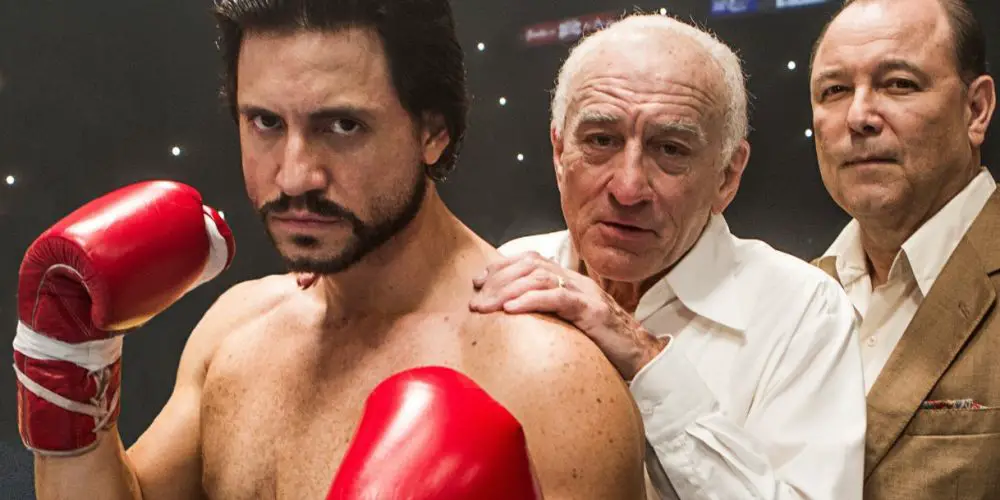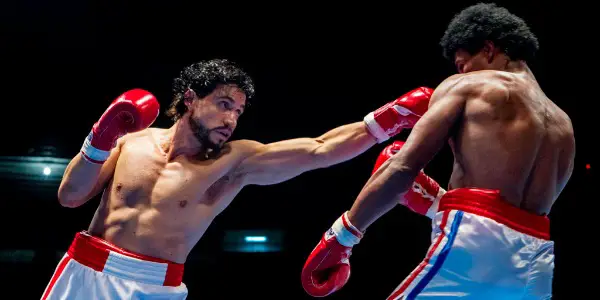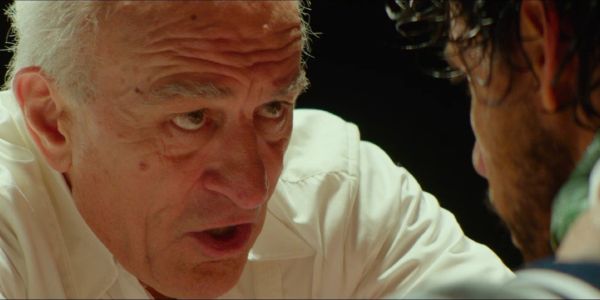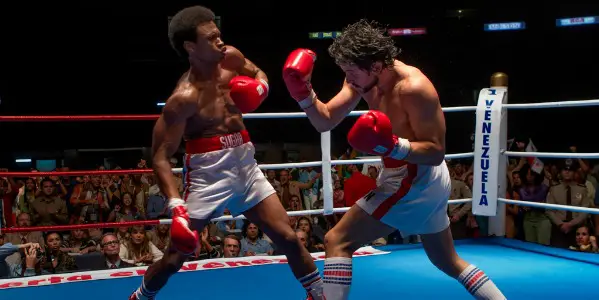HANDS OF STONE: Champion With A Chip On His Shoulder

Jim Dixon retired from practicing law not a moment too…
Edgar Ramírez is electrifying as welterweight boxing champion Roberto Durán in the new movie Hands of Stone. Unfortunately, writer/director Jonathan Jakubowicz’s routinely conceived, routinely executed boxing biopic is a dull canvas for a performance, slashed in such angry red brush strokes. The movie goes the distance, though not as cleanly or directly as we might have wished.
The film takes place from 1964 to 1983, tumultuous years for the nation of Panama, and for the young Roberto Durán. Durán grows up with a chip on his shoulder – his father was an American Marine who had an affair with a Panamanian woman during the US occupation of Panama, and left his family behind in the slums of Panama when he was relocated.
The only other Americans he sees growing up are privileged in comparison, and the movie depicts them as looking like a Young Republicans Club pep rally at a tan Ivy League school.
In Boxing, Even When You Win, You Get Hurt
Joyce Carol Oates, the most unlikely celebrator of boxing, and one of its most cerebral, reportedly said that while people talk about playing baseball, football or basketball, no one talks about “playing” boxing. “Even if you win,” she said, “you get hurt.”
She also said: “Life is like boxing in many respects. But boxing is only like boxing.” According to Martin Scorsese’s portrait of Jake Lamotta in Raging Bull, that point was lost on LaMotta. And in Hands of Stone, it is also lost on Roberto Durán.

That chip on his shoulder seems to be the sole motivating factor with Durán, who for much of the movie never seems to develop beyond a c*cky, thuggish SOB. That didn’t stop audiences from latching onto Jake LaMotta in Scorsese’s Raging Bull, still widely considered the best boxing movie of all time. It isn’t hard to grasp that Durán’s blustering macho just barely conceals a deeply grooved inferiority complex.
In his head, he’s still just a kid from the streets – he never learns to read. The US military presence in Panama (American soldiers are presented as infuriatingly arrogant and bullying) is a bitter, continual reminder of his resentment towards his absent father, and his resentment of his father feeds his anger at America.
Sports Movies Are Always About Something Else
All sports movies, all of them, are always, and without exception, really about something else. Here, it’s what’s motivating Durán – that chip on his shoulder, and what put it there. None of this is terribly difficult to get, and Ramírez effectively embodies the bravado and the bluster. But how long can you present an unpleasant protagonist and keep the audience with you?
The question is whether he can grow past his anger, finding not precisely redemption, but peace with his past. It’s clear that Durán’s toughest opponents are his own demons, and perfectly good drama can be had watching him conquer them; that is, if the audience doesn’t just tune out on him by the third act.

One of the reasons they won’t is Cuban actress Ana de Armas, who plays Durán’s longtime wife, Felicidad Durán, who stood by Durán in real life through good times and bad. If she sees something else in the character, maybe the audience is likely to think they should as well.
De Armas, who plays Felicidad with both a titanium backbone and volcanic sexuality, is a match for Ramirez’s thunderbolt presence. It bears noting that the movie’s R rating is largely due to a couple of well-directed sex scenes that are substantially steamier than have been seen in mainstream movies lately.
Ruben Blades, hot off a colorful turn on AMC’s Fear the Walking Dead, plays a wealthy Panamanian businessman who can finance his quest to be a world class fighter. But the key figure in his life is veteran trainer Ray Arcel (Robert De Niro), who trained 18 prior world champions before being run out of the fight game by the mob, who disapproved of his plans to take the fight game national via television. It’s Arcel who manages to teach Durán the art of fight strategy.
Ramirez electrifies, de Armas smolders, and both Blades and De Niro are fascinating to watch, but it’s De Niro, as Arcel, who gives the movie its soul. Arcel senses a fury in Durán, a fury that makes him want to get back in the game, although to do that he has to make a deal with the mobsters who forced him out, agreeing to take no payment for his services.
De Niro is Oscar-worthy here, unostentatiously finding the quiet center of a complex man. Between rounds, he combs Durán’s hair so his opponent will think he’s fresh and unfazed. It’s also unexpectedly sweet and fatherly. John Turturro, by the way, is brilliant in an understated performance as the face of the mob.
Paint by Numbers Plotting
The trajectory of Durán’s career as presented here is paint-by-numbers, and Jakubowicz, doesn’t find many nuances within the situations. Durán continues to knock out opponents until he inevitably gets his shot against undefeated world champion Sugar Ray Leonard. Jakubowicz’s screenplay is logical and workmanlike but unevenly paced, and many viewers are likely to feel there was too much talk and not enough boxing.

Pop star Usher, here billed as Usher Raymond IV, effectively captures Sugar Ray Leonard’s exuberance and showmanship. Durán sadistically psychs out Sugar Ray before their fight by viciously insulting his wife in public, and you hate him for it. But he gets Leonard out of his subtler fight strategy, pulling him into the gutter.
Raging Bull Casts a Long Shadow
Raging Bull casts a long shadow over Jakubowicz’s biopic of Durán. Jakubowicz is smart enough to know that, and incorporates homages to Scorsese’s movie, including a ’50s flashback done in black and white. Yet, it isn’t in his best interests. His fight scenes, reportedly authentically choreographed from the real fights they’re based on, try to replicate Scorsese’s, but don’t come within an arm’s length.
To be fair, every boxing movie since Raging Bull has been influenced by those boxing scenes (Stallone reportedly hired Scorsese’s entire sound effects team from Raging Bull for Rocky III ) and in recent years, there have been some worthy evolutions. David O. Russell’s dizzying handheld camera work in The Fighter made the audience feel an even more intimate sense of involvement.
Last year, Ryan Coogler’s Creed added astonishingly fluid, long unbroken takes. The bar here has gotten high, and Jakubowicz hasn’t done anything particularly new. Worse, the viewer’s sense of who’s winning or losing is largely dependent on the swelling of the music.
Conclusion
Neither as revolutionary nor revelatory as Raging Bull, nor as feel-good and redemptive as Rocky or The Fighter, Hands of Stone is a serviceable, reasonably entertaining biopic of Roberto Durán, with first rate performances that elevate it above its pedestrian execution. They called Durán “Manos de Piedra” – “Hands of Stone” – because of how hard he hit. Hands of Stone wishes it had that same kind of impact.
What do you think? Where does Hands of Stone rank in the annals of great boxing movies?
Hands of Stone is now playing in select theaters in the US. Find international release dates here.
https://youtu.be/1W1L0WnVnjY
Does content like this matter to you?
Become a Member and support film journalism. Unlock access to all of Film Inquiry`s great articles. Join a community of like-minded readers who are passionate about cinema - get access to our private members Network, give back to independent filmmakers, and more.
Jim Dixon retired from practicing law not a moment too soon, and now works as a freelance writer and film critic. A lifelong and unrepentant movie geek, he firmly believes that everything you need to know in life you can learn at the movies. He lives in upstate New York.












